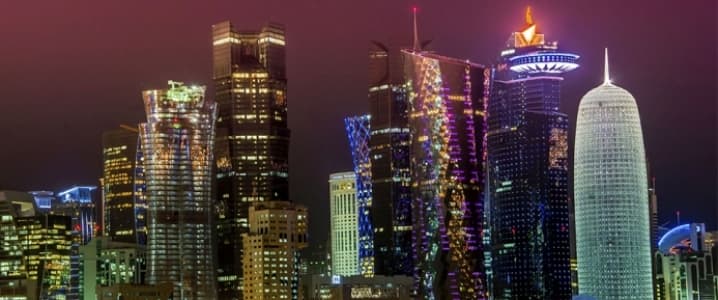The four countries leading the boycott against Qatar are going back to their list of 13 demands for Doha to meet before talks can start, essentially reverting the Arab Gulf spat back to square one.
At the same time, economic data for June shows that Qatar’s imports plummeted due to the blockade imposed by most of its neighbors, and foreign deposits at Qatari banks dropped to their lowest in nearly two years.
However, Qatar has a huge sovereign wealth fund, and boasts considerable foreign exchange reserves. Although Qatar’s non-oil economy is expected to see some pressure due to the fact that it has to use alternative trade routes, the world’s largest LNG exporter has not seen its LNG trade disrupted yet, which is precisely why analysts do not see the blockade as potentially crippling Qatar’s economy. Rather, they see it as merely straining economic growth.
Saudi Arabia, Bahrain, Egypt, and the United Arab Emirates (UAE) – the four countries leading the boycott on Qatar – issued on June 22 a list of 13 demands to Qatar, which included severing ties with Saudi archrival Iran, and shutting down the Al-Jazeera TV network.
Two weeks ago, diplomats from the four countries signaled that they no longer wanted Qatar to comply with the 13 demands, instead proposing six broad principles that they want Qatar to sign onto. The principles included denying safe havens and financing to terrorists, combating terrorism and extremism, stopping incitement of hatred and violence, and refraining from interfering in the internal politics of other countries, the New York Times reported.
This past Sunday, however, the four countries said that apart from the six principles, they insisted on Qatar meeting those 13 demands, reverting to their original conditions, which analysts had thought were too steep for Qatar to meet.
“We are back to square one,” Abdullah Al-Shayji, a political science professor at Kuwait University, told Bloomberg, commenting on the latest twist in the Qatar crisis.
“We have not progressed an inch because we were under the impression that the 13 demands were not only null and void but channeled into six principles. It seems that they are not budging and are escalating,” Al-Shayji said.
The blockade imposed by the four states is forcing Qatar to seek alternative—and more expensive—routes for trade, and its imports dropped in June by 40 percent compared to June last year, Bloomberg data show.
Qatar is flying in cows from Germany to address milk demand, and is arranging new shipping routes through ports in neutral Oman.
Related: The Next Big Catalyst In The U.S. Oil Export Boom
But Qatar’s continuing oil and gas exports, as well as significant forex reserves, are the reason why analysts are not as pessimistic as they would have been if LNG trade were disrupted or cash reserves low. The latest Reuters poll on the Gulf economies lowered expectations for Qatar’s economic growth this year to 2.3 percent from the previous 3.5-percent-growth forecast. Still, analysts expected Qatar to outperform most of its neighbors, including Saudi Arabia whose median GDP growth estimate was reduced to just 0.1 percent this year, from 0.5 percent expected earlier.
The Qatar Central Bank has US$40 billion in cash reserves plus gold, while the Qatar Investment Authority has US$300 billion in reserves that it could liquidate, the Governor of Qatar Central Bank, Sheikh Abdulla Bin Saud Al-Thani, told CNBC in an interview in early July, one month into the blockade. “We have enough cash to preserve any - any kind of shock,” the governor said.
Qatar’s LNG flows are stable, Steve Hill, Executive Vice-President for Gas and Energy Marketing and Trading at one of the largest LNG traders, Shell, said on July 10.
On July 4, Moody’s changed the outlook on Qatar’s rating to negative from stable, on expectations that the dispute would not end quickly. But the rating agency affirmed the long-term issuer and senior unsecured debt ratings of Qatar, citing “sizable net asset position of the government and exceptionally high levels of wealth.”
“Moody's also acknowledges the fact that as long as hydrocarbon exports are not disrupted, the ongoing dispute will not affect the overwhelming majority of foreign exchange receipts in the current account balance and the bulk of government revenues,” the rating agency noted.
An end to the dispute is currently nowhere in sight. Just a day after the four states reverted to their 13 demands, Qatar said that it had filed a complaint with the World Trade Organization (WTO) to challenge the boycott.
Qatar requested consultations with Saudi Arabia, Bahrain, and the UAE, triggering a 60-day period for the three countries to either settle the trade complaint or face litigation at the WTO, Reuters reported, citing the director of Qatar’s WTO office Ali Alwaleed al-Thani.
By Tsvetana Paraskova for Oilprice.com
More Top Reads From Oilprice.com:
- This Oil Price Rally Has Reached Its Limit
- Is The Mafia Helping ISIS Smuggle Oil Into Italy?
- Asia’s Warren Buffet Faces Off Against The Utility Industry


















